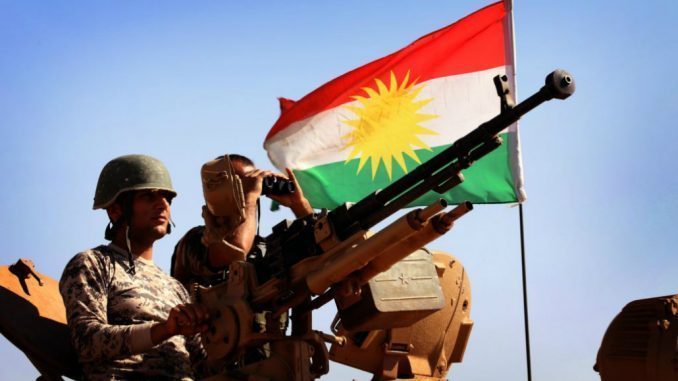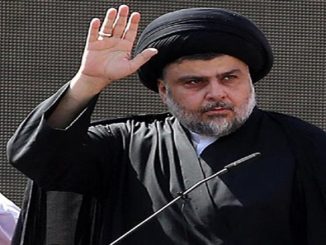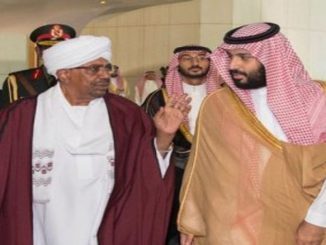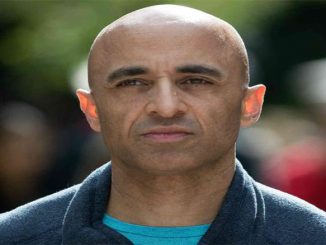
After the Kurdish federal government in Iraq declared their plans in holding a referendum on the independence of their regions after ousting ISIS, Iraq’s Shiite ruling coalition would oppose this move, its president, Ammar Al-Hakim, has said.
At the height of its power two years ago, Islamic State ruled over millions of people in territory running from northern Syria through towns and villages along the Tigris and Euphrates river valleys to the outskirts of Baghdad in Iraq.
However, ISIS’s territory is shrinking rapidly since last year as the US-led coalition, the Turkish-backed forces, and the Russian-backed Assad regime forces have fierce fights against its forces in both Syria and Iraq.
The United States is providing air and ground support to Iraqi and Kurdish forces trying to dislodge the hardline group from Mosul.
The Kurdish militias played a major role in the U.S.-backed campaign to defeat Islamic State.
Iraqi forces captured the eastern side of Mosul in January after 100 days of fighting and launched their attack on the districts that lie west of the Tigris river on Feb. 19.
While the fall of Mosul would effectively end the “caliphate”, it will not solve deep divisions over power, land, and resources between Iraq’s Shi’ite Arab, Sunni Arab and Kurdish communities.
Referendum on independence
The Kurds already run their own autonomous region in northern Iraq and the official, Hoshiyar Zebari, indicated the expected ‘yes’ outcome in a vote wouldn’t mean automatically declaring independence.
But with Kurdish forces also controlling wider territory regained from Islamic State, the referendum plan adds to questions about Iraq’s unity after the militants have been ousted from Mosul.
The two main Kurdish parties, the Kurdistan Democratic Party (KDP) and the Patriotic Union of Kurdistan (PUK), agreed at a meeting on Sunday that a referendum should be held this year, Zebari, a senior member of the KDP leadership, told Reuters.
“The idea of a referendum has been re-energized,” Zebari, a former Iraqi foreign and finance minister, said in an interview in Erbil on Wednesday evening, commenting on the meeting held with the PUK’s leadership.
The two rival Kurdish groups issued a joint statement on Sunday declaring support for the plan of holding a referendum, leaving its exact timing to an agreement with other, smaller Kurdish groups.
Zebari described the aim as “self-determination”, leaving open the exact nature of any deal with Baghdad following the referendum when Kurds would be likely to vote strongly for independence.
“It will give a strong mandate to the Kurdish leadership to engage in talks with Baghdad and the neighbors in order to get the best deal for Kurdish self-determination,” he said.
Ruling coalition refuses
Speaking in an interview in Cairo, Ammar al-Hakim advised the Kurds against any unilateral move to annex a disputed oil-rich region which they had gained during the war against the jihadists.
“If this referendum happens, it will be unilateral,” said Hakim, who is president of the National Alliance, a coalition of the main Shi’ite political groups including Prime Minister Haider al-Abadi’s Dawa party.
“We will insist on dialogue” as a mean to resolve the disagreement, the influential cleric said when asked what the Shi’ite parties would do if the Kurds insist on holding the referendum.
“We believe that the politics of accomplished facts and drawing borders with blood hasn’t succeeded in any country of the world and won’t have good results in Iraq either.”
Hardline Iranian-backed Iraqi Shi’ite militias have threatened to expel the Kurds by force from this region and other disputed areas.
Hakim, however, downplayed the risk of military confrontation between the Shi’ite and the Kurds.
“Using weapons against Iraqis is not an option,” he said.
Kirkuk’s Kurdish-led provincial council rejected this month a resolution by the Iraqi parliament in Baghdad to lower Kurdish flags raised since March next to Iraqi flags over public buildings in the region.
Masrour Barzani, head of the KRG’s Security Council and son of President Barzani, said in June that Iraq should be divided into three separate entities to prevent further sectarian bloodshed, with a state each given to the Shi’ites, the Sunnis, and the Kurds.
Hakim said he suggested to Egyptian President Abdel Fattah al-Sisi, whom he met on Tuesday, to host a meeting of rival Sunni and Shi’ite countries in the region to try to find common grounds in the prelude to ending the sectarian strife raging since 2011.
Regional tension
Iraqi Kurdish independence has been historically opposed by Iraq and also its neighbors, Iran, Turkey, and Syria, as they fear the contagion for their own Kurdish populations.
Iraq’s Kurds are the community to have advanced the most toward their long-held dream of independence. Iraq has been led by the Shi’ites since the overthrow of Saddam Hussein, a Sunni, in 2003, following a U.S.-led invasion.
They run their own affairs in the north, through a Kurdistan Regional Government (KRG), led by KDP leader Massoud Barzani.
They have their own armed force, the Peshmerga, which prevented in 2014 Islamic State from capturing the oil region of Kirkuk, after the Iraqi army fled in the face of the militants.
Turkish Prime Minister Binali Yildirim said last week that his country would not accept any attempt to declare an independent Kurdistan and to incorporate Kirkuk into the KRG despite their relatively close ties with the KRG. He also disputed the Kurdish historical claim to the city, telling Turkish TV on Saturday that Kirkuk was “a Turkmen city.”
Turkish President Tayyip Erdogan also warned the Kurds on Tuesday that failure to lower the Kurdish flags would damage their relations with Turkey.
“We don’t agree with the claim ‘Kirkuk is for the Kurds’ at all. Kirkuk is for the Turkmen, Arabs, and Kurds if they are there. Do not enter into a claim that it’s yours or the price will be heavy. You will harm dialogue with Turkey,” he said at a rally in the Black Sea province of Zonguldak.
“Bring that flag down immediately,” he also said.
Iran has waded into the Kirkuk flag controversy with a government spokesperson expressing support for Iraq’s territorial integrity and warning against increasing tensions in the country.
“Hoisting any flag except Iraq’s national flag in Kirkuk in northern Iraq is contradictory to the country’s constitution and will increase tensions,” said Foreign Ministry Spokesperson Bahram Qassemi, as reported by Fars News.
He warned against dividing the attention of the Iraqi government, adding that Iran remains steadfast in its support for Iraq’s territorial integrity and national sovereignty.
The United Nations has also weighed in to oppose the Kurdish flag in Kirkuk. Kurdish officials, however, remain unperturbed. “It is impossible for Kurdistan’s flag to be lowered again,” said Rebwar Talabani, the acting head of the provincial council.



